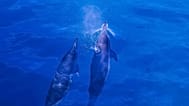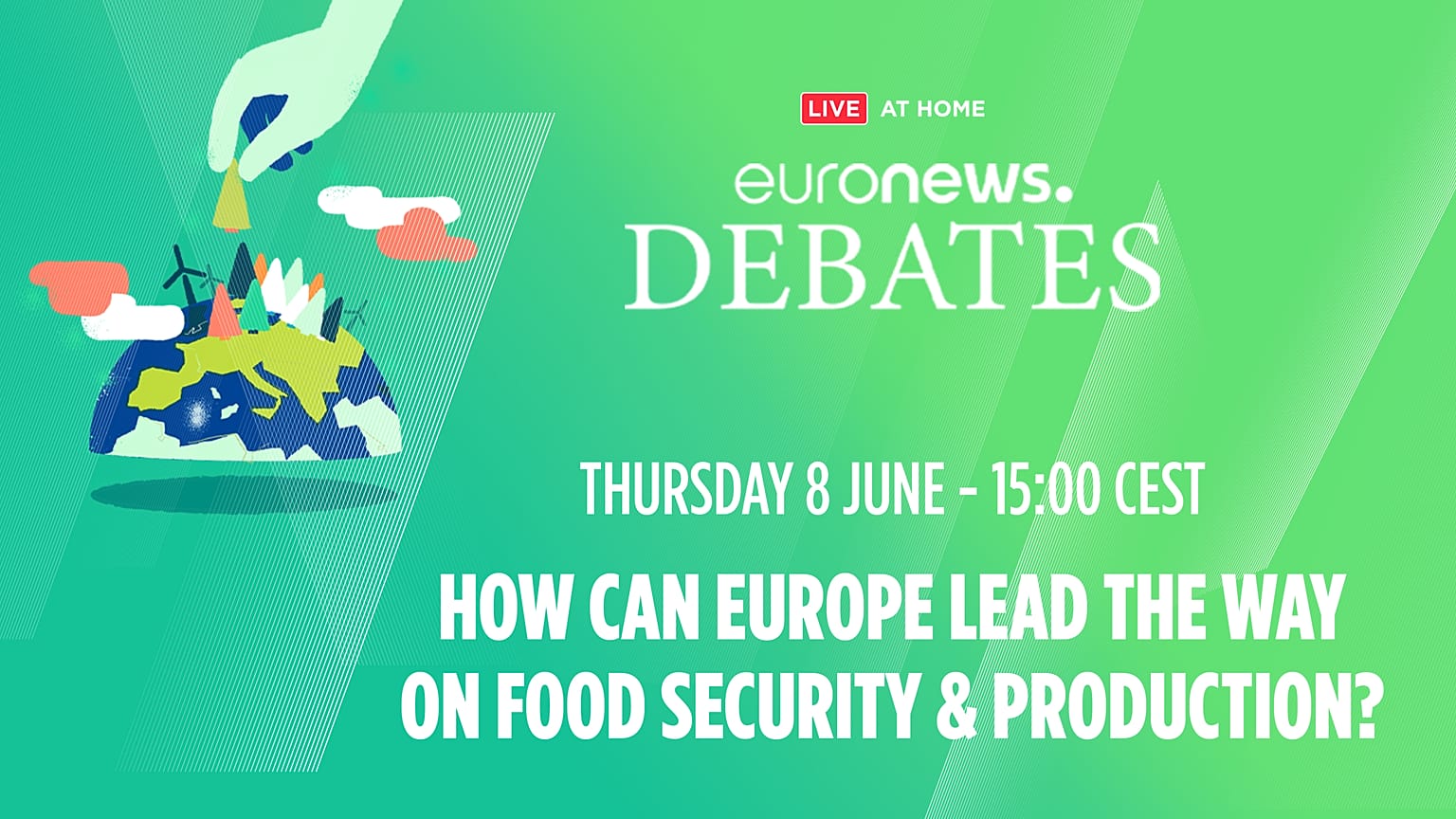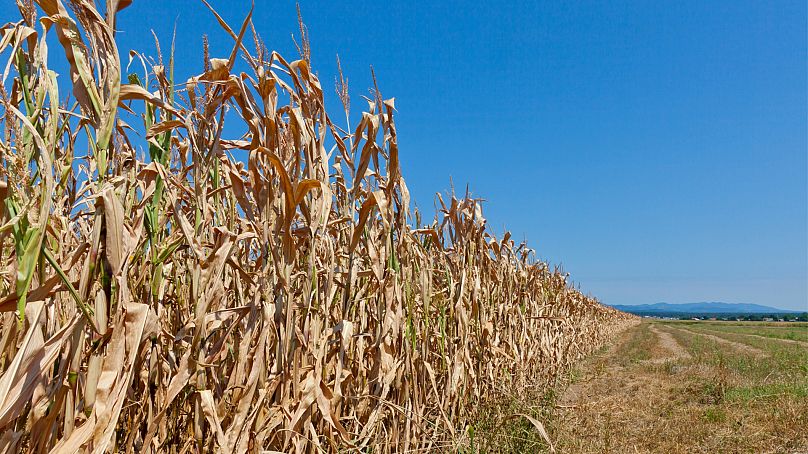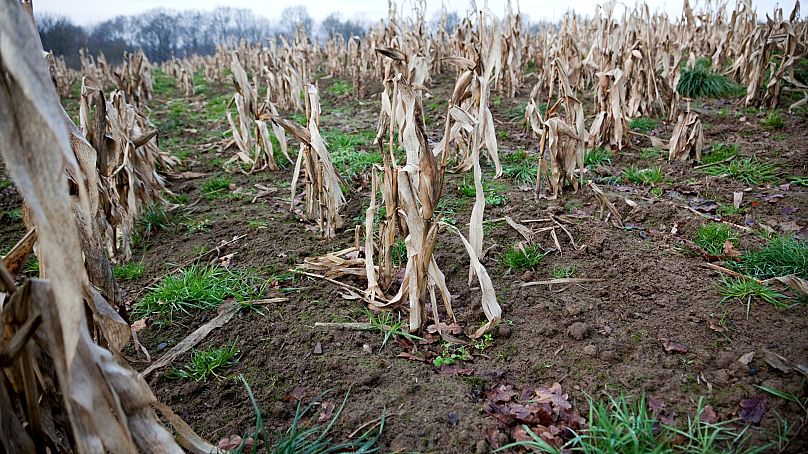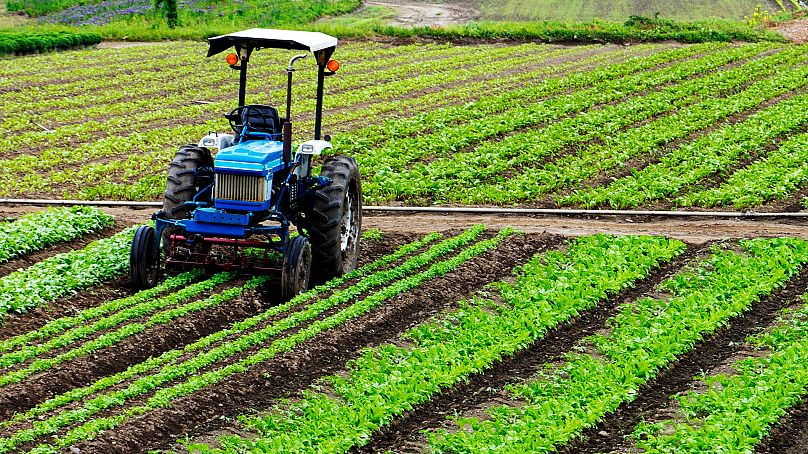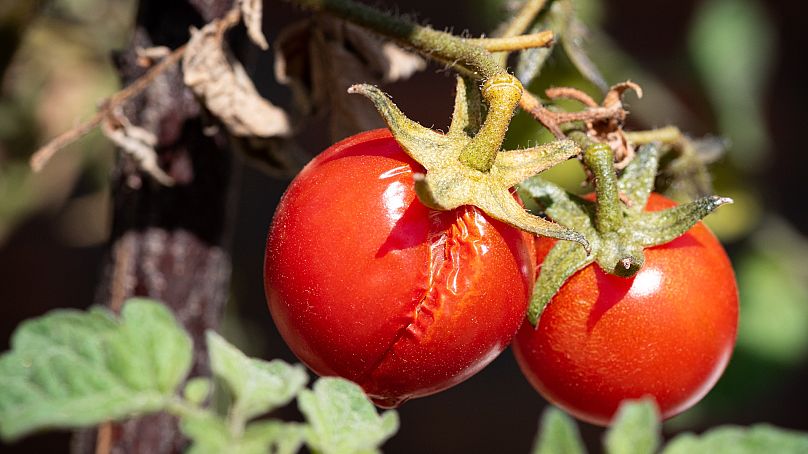As part of Euronews' Green Week, our expert panel debated whether Europe can future-proof its food security in the face of climate change and rising global hunger.
More and more people are going hungry globally. The World Food Programme (WFP) estimates that 345 million people are now facing acute food insecurity, more than double the number affected in 2019.
 ADVERTISEMENT
ADVERTISEMENT
 ADVERTISEMENT
ADVERTISEMENT
The combined shocks of the COVID-19 pandemic, the war in Ukraine and spiralling food, fuel and fertiliser costs have ignited a cost of living crisis across Europe and the world.
The climate emergency is playing a role too. According to the UN, climate change is now one of the “leading causes” of global hunger, with the food crisis likely to “spiral out of control” if the world fails to take immediate action.
While the situation is most pressing in East African countries such as Somalia and Ethiopia, the impacts of climate change are being felt across the globe. In Europe, food security is being threatened by extreme weather, with the continent now in drought since 2018, according to a recent study from the Graz University of Technology in Austria.
The situation is being made more complex by the climate impacts of the food system itself, creating a feedback loop where the emissions from global food production are making climate change worse.
As the climate emergency escalates, will technology and innovation make food systems more resilient? And if innovation is the answer, who is going to pay for it?
As Europe looks to the future, what will the changing climate mean for our diets, and will consumer food choices help to steer us in a more sustainable direction?
As part of Euronews’ Green Week, we put these key questions to our panel of experts.
_You can watch the full debate in the video above. _
Is food production causing climate change?
The debate began with a stark warning from Edward Davey, Director of Partnerships, Food & Land Use Coalition (FOLU) & Co-Director, World Resources Institute UK.
"The global food system causes in the order of 30 per cent of global greenhouse gas emissions, he said, "but for a long time the climate conversation has been largely focused on energy."
This isn't the only shocking statistic though. Currently, animal products make-up two-thirds of all agricultural emissions and use more than three-quarters of agricultural land. Food production is water intensive too, with an average of 70 per cent of the world’s freshwater used during agricultural production.
To make matters worse, roughly a third of all food produced for human consumption is lost or wasted, with the EU wasting approximately 131 kg per person in 2020 alone.
Global attitudes are changing though, as policymakers and climate scientists continue to shine a light on our food systems.
"The UAE in their role as incumbent COP28 president want to focus on food in a significant way in Dubai and they’re talking about a leaders summit on food and climate on the first day of COP28," said Davey.
There will also be a possible leader's declaration, he continued, which heads of state would be invited to sign.
How is the EU planning to improve food security?
The EU cites the climate, a lack of resources and population growth among the factors behind its Food 2030 policy, which seeks to make European food systems more sustainable, while ensuring everyone has enough affordable and nutritious food.
With research and innovation at its heart, the policy covers everything from land and water-based production, to food processing, retail and distribution, packaging, waste and recycling, and consumption. It aligns with the EU’s flagship Green Deal vision.
“There are some remarkable things happening in the EU," said Davey. "The Farm to Fork policy, the sustainable food systems framework, the soil health directive, and the nature restoration law, which is currently under review.”
However, the war in Ukraine has shifted the the debate somewhat, meaning the EU has had to focus more on growth more than it did before the conflict.
“There was a clear shift towards more green types of agriculture production until February last year, when a lot of the discourse went into ‘what are we going to produce, how can we be more food secure?'" said Guillaume Gruere, Acting Head, Agriculture and Resources Policies Division, OECD Trade and Agriculture Directorate.
While the war in Ukraine forced the EU to look at food security in a new light, Gruere said they are still focused on the environmental impacts of food production, with a focus now on sustainable productivity growth: producing more food with fewer inputs.
"It doesn't necessarily mean increasing production forever," he says, "it means doing it better and more sustainably, without increasing emissions, and actually reducing emissions."
Research has shown that EU citizens are hungry for change too. A 2022 WWF report found that 74 per cent of respondents believed that Europeans should eat food that is better for the environment, while 66 per cent agree that eating sustainable food is key to tackling climate change and biodiversity loss.
In order to make food systems more resilient though, the EU must combine technological innovation and regenerative farming, while increasing the diversity of its cereal crops to ensure resilient food for the future.
How can innovation make food systems more resilient?
Building innovation into the current food system is a complex undertaking, especially as the climate emergency evolves.
In the long term, the EU is looking to reduce its dependence on imports such as fertilisers and plant-based proteins for animal feed, while at the same time funding projects which provide solutions to climate issues.
“Innovation and tech have a significant role to play," said Gruere. "We have been recognising it for a while, so a lot of our work has also been about moving the finance to this area."
One of the latest projects to receive EU funding is the Greek based initiative CrackSense. The project aims to address the problem of fruit cracking, which can happen due to an erratic water supply and leads to fruit drop and yield loss. By developing and upscaling sensing technologies, the project is able to provide real-time data on fruit conditions, which could be adapted for other crops too.
“We experience more than 30 to 40 per cent yield loss per annum in grape growing," explained Prof. Mladen Radisic, , CEO, Foodscale Hub & Communication Manager, CrackSense.
"This is something we want to monitor so we can understand how an everyday farmer can treat their yields in a better way.”
While technical innovation is necessary, Davey cautioned that the ethics involved must be clear too.
"We need to have an ethical framework and avoid this notion that technological innovation itself will be the salvation in the absence of other shifts," he explained.
“We could optimise cattle production in a way to keep the amount of cattle we already have in the world, but at the same time we observe that in many parts of the world, cattle are causing other environmental challenges.”
Guillaume Gruere noted that calloboration between the public and private sectors is key to success too.
“It’s a shared responsibility, and you need to have a lot of public and private collaboration. It's key to foster collaboration towards the same goals.”
Do changing eating habits play a role too?
“The other thing that is happening in Europe is that consumers are professing to want to eat less meat," explained Davey.
"There’s a significant increase in flexitarianism, vegetarian and veganism and that’s part of the story as we move forward together.”
Interest in sustainability in food is growing across Europe, and consumers are now more interested in transparency and traceability when it comes to the food they eat.
As red meat consumption declines in the EU, consumers may be more willing to try alternative sources of protein, something Marloes Martens, Product Manager, Human Nutrition & Health, Ynsect is banking on.
“We are breeding meal worms in our vertical farms and we basically convert them into high quality ingredients for pet food plans and the human nutrition industry," she said.
“Insects contain a lot of vitamins, minerals and high quality protein but with a lower impact on climate change.”
While getting European acceptance of their product is proving a challenge, with insects popular in other parts of the world, Martens hope it is only a matter of time.
While innovation's like Ynsect are crucial to future food security in Europe, such solutions are only one part of the puzzle.
“There’s no panacea to the global food system," says Davey, "everything has its role to play.”
What's most important, he says is "making the transition in true partnership with farmers.”
Meet the panellists:
Edward Davey, Director of Partnerships, Food & Land Use Coalition (FOLU) & Co-Director, World Resources Institute UK
Edward Davey is the Director of Partnerships at the Food and Land Use Coalition. He is responsible for ensuring that FOLU drives real and lasting impact in international processes and institutions on the food systems agenda. Edward is also Co-Director of WRI UK. He is the author of 'Given Half A Chance: Ten Ways to Save the World,' published in 2019.
Guillaume Gruere, Acting Head, Agriculture and Resources Policies Division, OECD Trade and Agriculture Directorate
Guillaume Gruere oversees OECD's policy work on climate change, environment and resources management in agriculture.
Prior to joining OECD, he was a Senior Research Fellow at the International Food Policy Research Institute. He has contributed to over 70 peer-reviewed publications, including two that received awards from the Agriculture and Applied Economics Association.
Prof. Mladen Radisic, CEO, Foodscale Hub & Communication Manager, CrackSense
Prof. Mladen Radišić is CEO at Foodscale Hub, an Impact Venture Studio working to accelerate the shift towards tech-enabled innovations in the agrifood sector. He is also a university professor specialising in Business and Finance.
He has previous experience in running large-scale projects and has organised international EU-funded business accelerator programs. These projects and programs provided €15 million to more than 300 European SMEs and startups, covering sectors such as agrifood, ICT, manufacturing, logistics, health, finance, energy, and environment.
Marloes Martens, Product Manager, Human Nutrition & Health, Ynsect
Marloes Martens is Product Manager of Human Nutrition & Health at Ÿnsect. As part of her role, she also works with R&D on the development of new products, as well as with sales – she is the link between the technical departments and the sales people.
As part of her Master’s degree in Health-Food Innovation Management at the University of Maastricht, she founded Oatelli, a project aimed at improving fibre consumption in the Netherlands.



